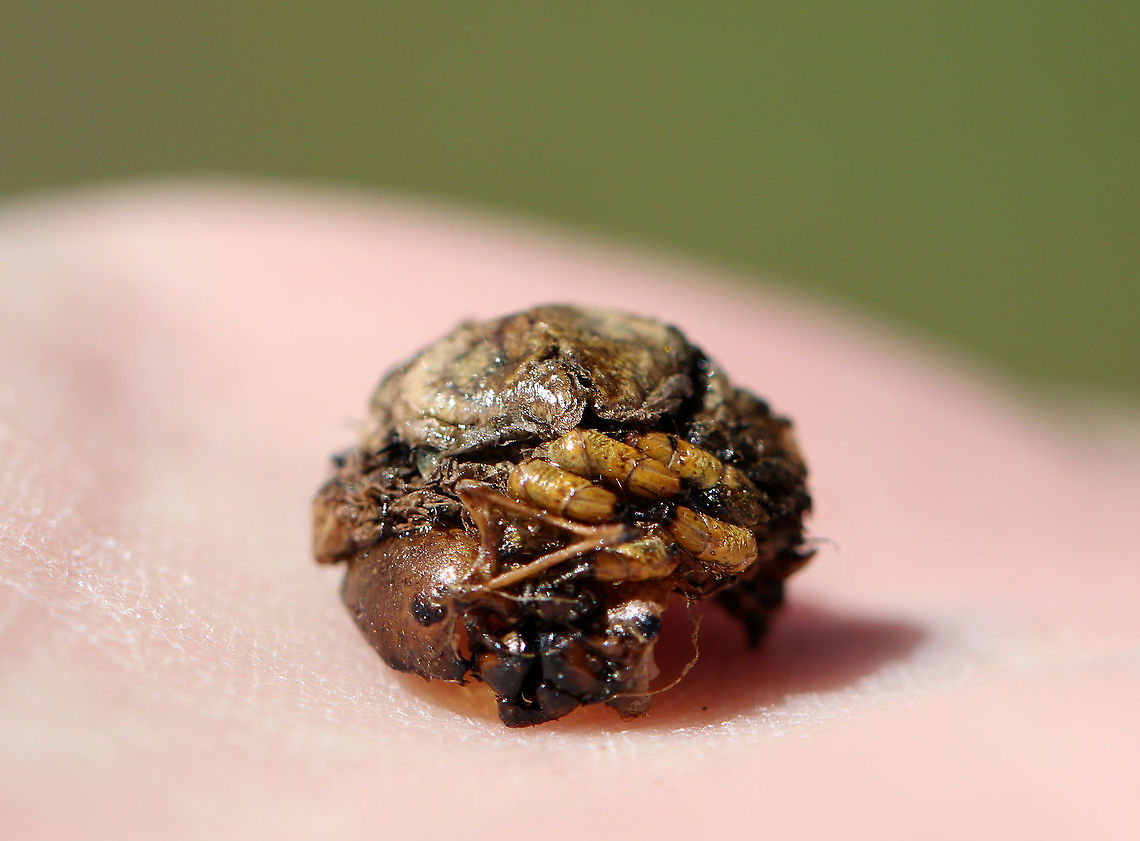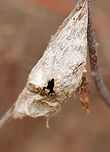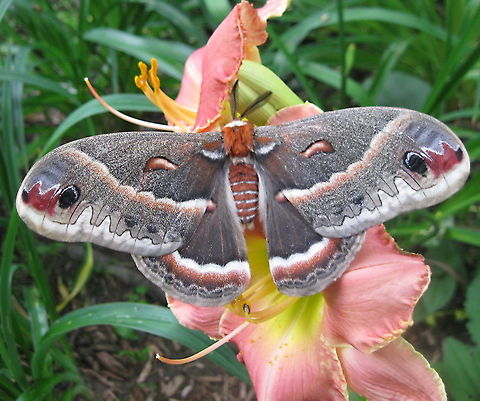 Promoted
Promoted
Parasitized Cecropia Moth Cocoon - Hyalophora cecropia
This is the remains of a parasitized cecropia moth pupa that I found inside of a cocoon.
Parasitoids are a significant problem for cecropia moths. Some species of wasps and flies lay their eggs on young cecropia caterpillars. The eggs hatch into larvae, which then consume the internal organs and muscles of the caterpillar. The parasitoid pest releases chemicals that actually override the regulatory mechanisms of the caterpillar, and once the parasitoid has grown enough, it induces the caterpillar to pupate. Once the caterpillar pupates, the parasitoid larvae themselves pupate and kill the cecropia pupa. When they are ready to emerge as adults, they make a hole in the cocoon, and fly away.
Here's what the cocoon looks like:


The Cecropia Moth is North America's largest native moth. It is a member of the Saturniidae family, or giant silk moths. Females with a wingspan of six inches or more have been documented. It is found as far west as the Rocky Mountains and north into the majority of Canadian provinces. The larvae of these moths are most commonly found on maple trees, but they have been known to feed on cherry and birch trees among many others.

comments (8)
In the Netherlands, we have a raging national debate about one particular national park called "Oostvaarderseplassen". In our tiny, crowded country we don't have the space for unmanaged nature, except for this park where an attempt is made. One effect of it being unmanaged (let nature run its course) is that about 25% of the mammal population (such as wild horses) don't survive the winter, which in the wild is normal.
Still, people cannot stomach these horses starve or freeze to death. There are violent protests, people cutting open fences and dropping food. Death threats to rangers. Emotions running sky high.
I can relate, but do have critical notes: the protest is selective as well as somewhat hypocritical.
It is selective in that we empathize most with other mammals, even more so with pet-like mammals that are generally loved like horses. Most protesters probably eat horse meat, as it is meat even cheaper than beef, and processed into many products. Few would protest the horrific lives of horses bred for food. Not a sound.
Nor is there a protest when tens of thousands of geese are shot yearly to avoid them doing some minor damage to agriculture. Nor is there a protest when wild pigs and deer are hunted at scale. Nor is there a protest when in some areas, wild flower and insect population have declined by 80%, which have an impact on general biodiversity a hundred times larger than some horses that don't even belong in this habitat.
The average dutch person eats giant amounts of meat (for the record, I do eat meat too). They brick their gardens as a few minutes of maintenance on plants is too much work. They destroy anything natural looking (weeds or insects) with aggressive chemicals.
Yet here they are standing in the front row, the "conservationists", fighting the good fight for nature.
Sorry for the unrelated rant, as you can see, it's a big issue over here. Posted 7 years ago
Craziness.
Humans are very selective in deciding which species they want to save. They think that they can selectively save or eliminate a species according to standards that are either commercial or aesthetic. Cute and cuddly usually wins. Nobody wants to snuggle with a snake, but they are enamored by the big, fluffy animals. The "ugly" creatures are in much more grave danger of becoming endangered than the adorable ones are. If it's too cute to die, then it stands a better chance of respect, conservation, and decent treatment.
Plus, people don't just judge on appearance, but as you alluded to with the geese, the annoying factor is important. Does the creature somehow provoke or annoy humans? If yes, then that species better watch out. Humans seem to think that they can control and wipe out whatever other living organisms don't suit their plans. An incredibly irritating viewpoint. These perversions and alterations are dangerous because they can be the impetus that redefines what is "natural" in nature. Humans are in danger of reshaping nature to suit themselves.
So, if a creature is cute, human-like, brings in revenue, and is not stinky or slimy or an economic roadblock, then it is deemed worthy to be preserved. But, that perspective puts most species in the loser category for the conservation lottery.
People don't seem to learn that protecting only one part of the system will still lead to the detriment of the entire system because it is all ultimately connected.
Where I live, most people hate insects. They use broad spectrum pesticides on their unnaturally green lawns. The pesticides kill every insect around. Bees, ants, beetles, butterflies - all lay on the ground twitching as they die. I tried to convince the owner of an apartment complex where I live to stop spraying these chemicals because they are killing the very pollinators that everyone claims they are desperate to save. But, they don't care. They want the bugs dead so they don't touch them or get into their houses.
This is a big issue worldwide, I think.
Posted 7 years ago
Indeed, the tolerance of people towards nature is close to zero. Another example is wolves returning to the Netherlands. Must be exterminated because they killed a few sheep. Farmers poison the nests of birds of prey, I still have no idea even why.
I do believe much of it comes from pure ignorance, people simply not knowing how nature works and never taught an appreciation for all of its components and how they relate to each other.
I can certainly say I too had much of this ignorance, and it has been a journey of increased understanding over the years. In particular the discipline of macro photography has taught me about the beauty and importance of the smallest, and how it is a foundation for everything.
So now I am deeply upset when somebody calls wood "sustainable" because after clear-cutting the crap out of a primary forest, they're replanting trees elsewhere. Yeah, and what about the millions of species of insects, plants and amphibians that took millions of years to evolve and developed deep specializations and relations with each other? No value...at all? The destruction is permanent and irreversible.
To end positively, I'd now consider myself an ambassador of the small, or try to. I consider it to need more conservation and education attention than the classic iconic fluffy mammals. And if not for conservation reasons, I personally also find the world of the small the most interesting, surprising and diverse, so many untold stories there. Posted 7 years ago
As you said, the destruction is not "sustainable" - not only are all the creatures affect during a clear-cut, but even the soil chemistry changes and moisture levels. Everything is altered and so much diversity is irrevocably lost.
Posted 7 years ago, modified 7 years ago
It's about our garden, we have both a front and back garden, the front obviously visible to the neighborhood. We don't have many plants in the front, yet if I don't act, it gets overgrown with weeds. Last week I was plucking away the weeds (as a good dutch citizen) when I had a closer look at them. I found many quite beautiful, not unwanted at all. My heart told me to just let them grow, and it would probably lead to a messy bunch of wild flowers attracting a bunch of insects.
That's my view. The cultural and neighborhood view would be that some slacking no-good depressed person lives in this house, given the poor state of the garden.
Nobody told me to do anything by saying anything out loud, yet still this invisible hand forced me to clear the weeds. In many ways I don't care what other people think of me, but deep down I do, like every human being. Plus, such a choice could also affect the reputation of my girlfriend, so in many ways life is easier by just complying.
I avoided the fight or questioning, and that's a tremendously sad conclusion, given that of all people, I should know better. The pressure is real though.
I shall have my way though by laying an increasingly large claim on the back garden for wild growth. We must end with hope. Posted 7 years ago
I hope you can have a lovely, wild back garden this summer :) Posted 7 years ago